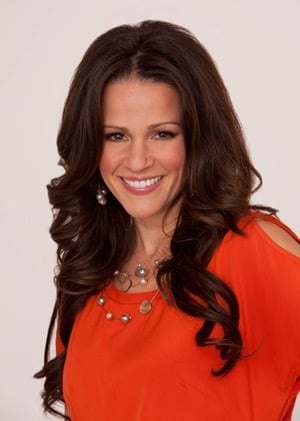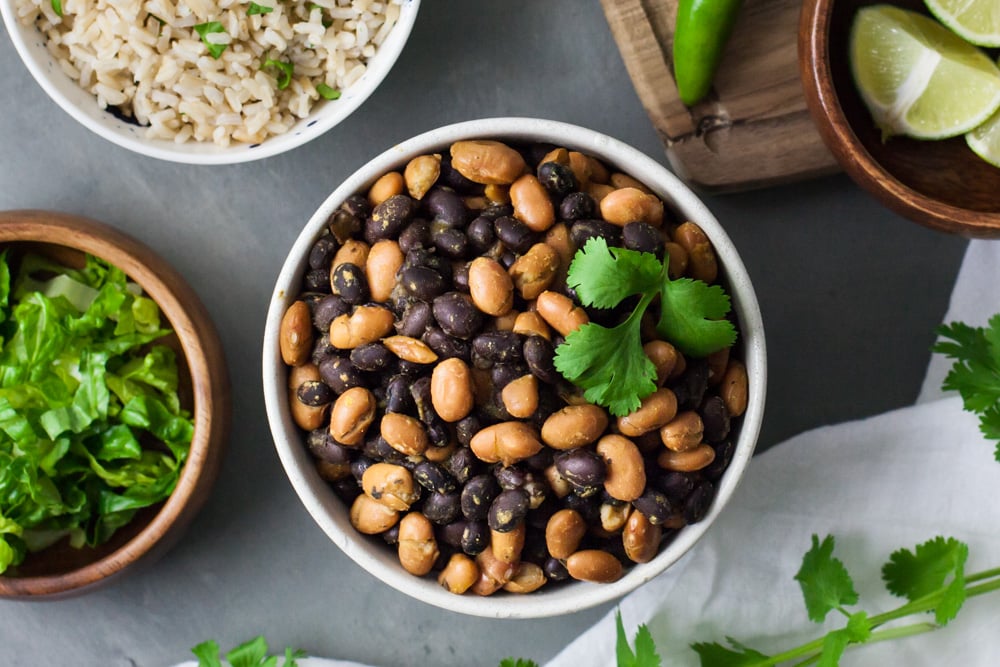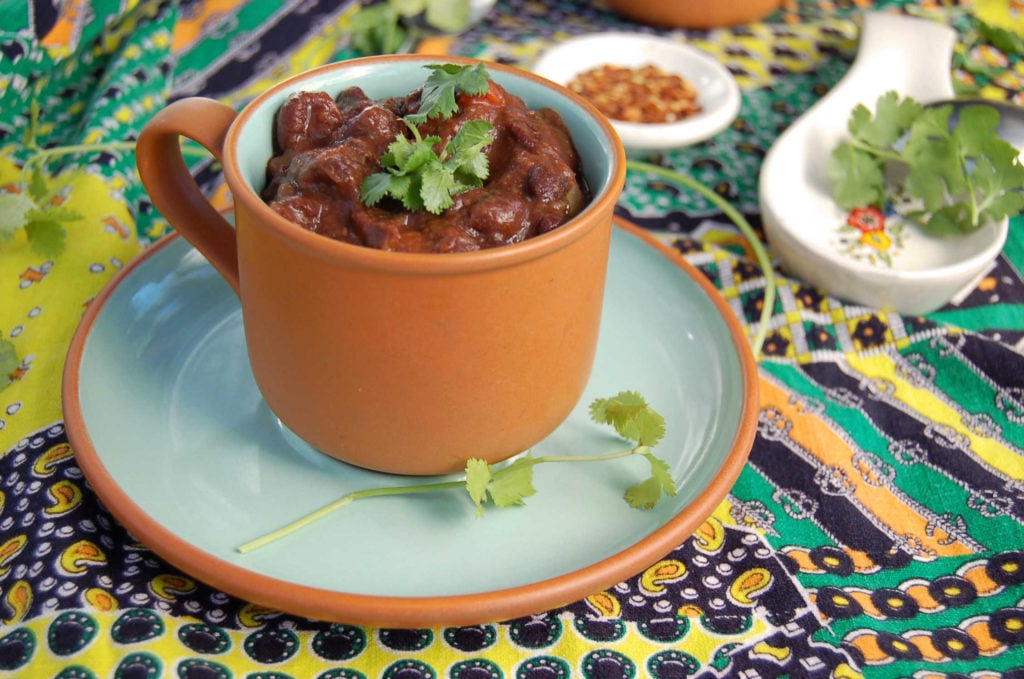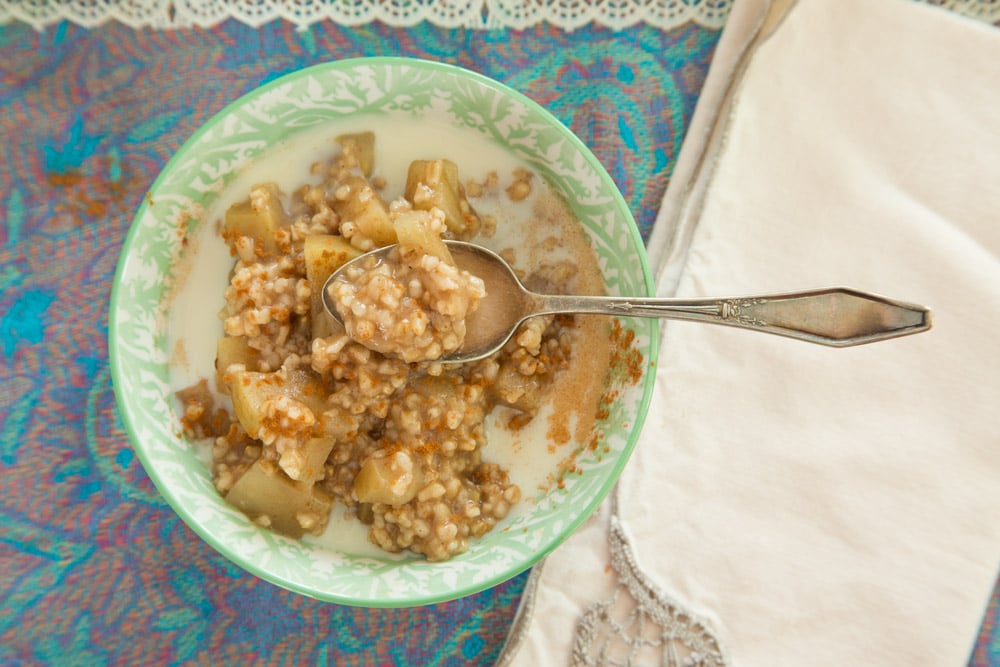My Interview with Julieanna Hever about A Whole-Food Plant-Based Diet

By Molly Patrick
May 31, 2014,
By Molly Patrick
May 31, 2014,
Back in the day, vegan food was considered weird hippie shit that was similar to rabbit food.
Eating vegetarian was a little less taboo, but still in the “not cool” category by society as a whole. Things started to shift a few years ago with vegan celebs popping up like pimples the day before prom. Today, veganism is accepted as a “cool” way to eat.
(Damn! Why didn’t this happen when I was an impressionable teenager, sporting my meat-free ways? Life would have been WAY easier!)
With the onslaught of all things vegan, you’ve probably heard the term “whole-food plant-based diet” or “WFPB”. This term was coined by T. Colin Campbell and it is the same thing as a vegan diet (no meat, no dairy, no eggs) but without the processed food.
Basically, you can have Oreos and fries on a vegan diet and you can’t have Oreos or fries on a WFPB diet.
If the vegan diet is Robin, then Batman is a WFPB diet. I’ve used Oreo and superhero analogies here and I’m hoping that between the two, the concept will stick.
Eating a whole-food plant-based diet is the way to go if you’re serious about getting healthy and lean.
Today, I have a special guest who is here to answer your most pressing questions regarding the whole-food plant-based diet. We even talk about farting (as if you needed extra incentive!)
Julieanna Hever is a busy woman. She’s the host of What Would Julieanna Do?, author of the best-selling book, The Complete Idiot’s Guide to Plant-Based Nutrition, and the nutrition columnist for VegNews magazine.
She’s the co-author of The Complete Idiot’s Guide to Gluten-Free Vegan Cooking and she has been featured on Dr. Oz, The Steve Harvey Show, E!, and many more.
She lectures extensively throughout the United States and internationally to spread the word about the benefits of eating a whole-food plant-based diet.
I caught up with her last week and asked her some questions from my readers. Read on and consider your confusion cleared up (just like your skin, the day after prom).
1) Molly: I want to talk about farting! One of the questions that I get most often is about tooting. When people switch from eating meat, dairy and processed food, to a whole food plant-based diet (WFPB), they often experience a plethora of gas and it can be rather uncomfortable. What’s up with the booty bombs and will it ever get better?
Julieanna Hever:
Essentially, this is a response by the body to the new onslaught of fabulous fiber! The good news is that the body absolutely adjusts with time and consistency. Ideally, you should slowly transition your diet, adding in the high fiber plants at a rate that does not cause discomfort.
Continue to build up until you feel comfortable and are eating an entirely whole food, plant-based diet. The added fiber will offer protection against many cancers, cardiovascular disease, excess weight, type 2 diabetes, and other chronic diseases, and is well worth the effort.
I also suggest drinking liquids separately from meals to avoid diluting digestive enzymes, which can help, but yet to ensure adequate water intake throughout the day to help move the fiber through your system.
Drink more than you think you need, about half your body weight (in pounds) in ounces of water (i.e. if you are 120 pounds, drink 60 ounces of water a day). There are enzyme supplements to help support you during the transition that help with digestion and gas. But stay the course and know that your body will adjust.
2) Molly: I can remember soy being a hot topic when I was 16, while working at a food co-op in my home town in New Mexico. This was in 1996! Soy is a huge grey area that people are perpetually confused about. Most people understand that processed isolated soy protein isn’t doing the bod any favors, but how about tofu, tempeh, soy yogurt, soy milk, miso, etc. Is there a healthy amount to eat of these products? As one of my readers put it, “the research out there is not very conclusive”. What do you have on the soy topic at hand?
Julieanna Hever:
There is absolutely no evidence that moderate doses of whole food soy products are harmful. Both high doses of anything and the intake of processed foods are what is risky.
Soy products are excellent sources of omega-3 fats, plant protein, fiber, and other nutrients. They have been shown to decrease the risk for heart disease and future breast cancer when young girls consume it regularly and they make for delicious wide variety in a healthy diet.
The American Institute of Cancer Research says that soy is safe for breast cancer survivors and considers moderation to be approximately two to three servings a day. A serving is either a cup of soy milk, 1/2 cup soybeans, or an ounce of soy nuts. I recommend opting for organic or specified non-GMO soy to avoid GMOs.
3) Molly: A lot of people are starting to shy away from grains and beans because of the current Paleo craze. Grains and beans are shunned in the Paleo world because of the Phytic Acid. Even gluten free grains like quinoa and amaranth are off limits. Can you touch on this?
Julieanna Hever:
Grains and beans are extraordinarily healthful and although phytates may inhibit absorption of certain minerals, the phytates themselves are disease fighting phytochemicals. Eating a wide variety of foods will help ensure adequate mineral intake and certain food processes- like sprouting, soaking, fermenting, leavening, blending, and juicing – help reduce the amount of phytates in the plant foods and enhance absorption of the minerals.
4) Molly: What are some of the biggest health risks with the Paleo diet?
Julieanna Hever:
The emphasis on animal products and the avoidance of certain healthful foods, like legumes and whole grains. Animal products contain saturated fats (which are still just as harmful as we have known them to be for decades, despite recent attempts to debunk that concept), cholesterol, pro-oxidative heme iron, naturally occurring steroids and hormones, and other unmentionables.
5) Molly: Nutritional labels. Super important for a lot of people. Are they necessary for people eating a whole-food plant-based diet or are they an old school way to think about food?
Julieanna Hever:
I do not like nutrition labels and believe they are more confusing than helpful. All we need to read on the label is the ingredient list. That list should contain as few items as possible and all ingredients should be recognizable and pronounceable.
6) Molly: Supplements. When eating a whole-food plant-based diet, do we need them? If so, which ones and at what dosage? Is there an ideal time of day to take them? Should they be taken with or without food?
Julieanna Hever:
Anyone eating plant-based should absolutely take a vitamin B12 supplement. It is simply not worth the risk of irreversible neurological damage that can ensue without warning over a period of time. You cannot get B12 in a reliable way from any plant foods and it is an easy, inexpensive insurance policy to simply take a pill.
I go by Dr. Michael Greger’s recommendation of 2,000-2,500 micrograms per week…not per day….but per week for adults. Take them anytime you will remember to take them. Just take them.
We are seeing lots of B12 deficiency in people who refuse to supplement. Vitamin D is a common deficiency worldwide, despite the type of diet. We are meant to get vitamin D from the sun. Yet, somehow, a huge chunk of the global population is deficient in it.
I don’t, however, recommend just taking a pill blindly, as D is a fat-soluble vitamin and I prefer to avoid supplements as much as possible. Instead, I recommend having your blood tested for vitamin D levels at your regular checkups and then trying safe sun therapy as a first line of defense.
If you are unable to increase blood levels (as most people are due to the latitude where they live, lack of sun exposure, excess fat on the body, or darker colored skin, etc.), then I recommend a supplement.
7) Molly: Can you talk a little about how processed sugar affects the body?
Julieanna Hever:
Refined sugars and all of its different derivatives and aliases impact the body in damaging ways. They can elevate triglycerides, blood sugar, adrenaline and have been associated with cancer cell growth, type 2 diabetes, tooth and gum decay, excess weight and obesity, behavioral issues, depression, anxiety, acne, and gastrointestinal disease.
Sugars are addictive, creating a vicious cycle where the more you eat it, the more you crave it.
The best approach to cutting it out of your diet is a commitment to getting it entirely out of your body. Avoiding all refined sweeteners and artificial sweeteners is the only way to break the cycle.
Use dried fruits like dates, date paste, date syrup and pure maple syrup to help transition your taste buds and know that within three weeks, you can completely eliminate cravings and addiction to sugars in this way. You will no longer want it nor will you enjoy it once it is out of your system.
8) Molly: If you are accustomed to eating processed foods, too much sugar, alcohol, lots of gluten and other crappy food choices, what can you expect, physically when you switch to eating a whole food plant-based diet? Is there a period of detox that happens? Are the symptoms different for everyone, or is there a general rule of what to expect?
Julieanna Hever:
Most people transition slowly and only notice positive benefits. If you have been eating a truly poor diet and go completely whole food, plant-based overnight, there may be a period of detox symptoms. One may experience some fatigue, gas or bloating from the increase in fiber (as discussed above), and may experience changes in bowel movements.
It may be ideal to transition slowly for most people to avoid any of these symptoms. If not, just ride it out knowing you are renovating your entire inside and will soon begin experiencing the comfort, joy, and energy from eating a nourishing diet.
9) Molly: You’re around a co-worker, family member or friend and you tell them that you’re going to give this clean eating thing a try. They come back with questions, judgment, and general non-acceptance.
Give us your elevator pitch for this scenario. (I would probably say something like, “don’t hate the playa, hate the game” and then walk away. Can you see why I want your answer?)
Julieanna Hever:
I like to say “it works amazingly for me” or “it’s changed my life” or “I can send you some info if you are interested” or “don’t knock it until you’ve tried it.”
The less you say, the better. Trying to convert, preach, convince, educate, judge back, get defensive, or getting frustrated never works. It merely makes you upset, shakes your core about your choices, offends the other person, or just ends negatively. The less you say, the better. Role modeling is the number one most effective tactic.
It takes people time – sometimes a very long time – to let go of their deep-seated beliefs about food, and they have to want to. You eating plant-based automatically makes others have to question their own choices, ones that were built in usually since childhood, even if you don’t intend for that to happen.
Make it personal for YOU, implying that this is something you are doing and never about them and what they should or should not do. Be compassionate to the other person as well as to yourself. Everyone experiences their journey with food in their own unique way and that is natural.
Thank you Julieanna, your knowledge and expertise has been a pleasure.
There you have it! I hope that this interview will bring you greater understanding of the Whole-Food Plant-Based diet.
I’m curious, are there questions that were left uncovered? Let me know in the comments below. I’d love to hear from you!
4 Comments
Leave a Comment
Love the food that loves you back
Get instant access to thousands of plant-based recipes and meal plans, no credit card or perfection required.













Thanks for those questions! I really wasn’t aware of the need for a B12 supplement when adopting a meat-free diet. I am trying to transition away from sugars in my eating habits, but I’m discovering they are everywhere! Any tips for snacking swaps? I have a 2yr old, so there are a lot of crunchy crackers around the house that call to me constantly
Hi Meg! – Absolutely! Have you signed up for me Saturday emails? I give lots and tips and tricks every week. Also, I have a One Week Clean Food Reboot that will be launching in the next few weeks. It is designed to help you kick salt, sugar and fat to the curb. Click on “make love to your life” at the top of this page. After you sig up for my emails, email me at [email protected] and I will email you a link to my email archives where you will be flooded with ideas and inspiration to snack on healthy things! Here’s the link to sign up for my emails: https://cleanfooddirtygirl.com/signup/
Thanks for the info. My husband and I have gone plant based for the past 3 weeks and its amazing how much better we feel. I didn’t know about the B12 thing, so am hoping I can find that here in Panama, yes, the country. I found your website while looking for a cashew cheese recipe – got my cashews soaking and am going to try that!
We have very little available here (that Ive found) other than your basic fruits and vegetables, but so far, am finding plenty of things to eat. Thanks again for all of this.
Congrats on 3 weeks – thanks for reaching out. Let me know how your cashew cheese turns out. Glad you found us! xo